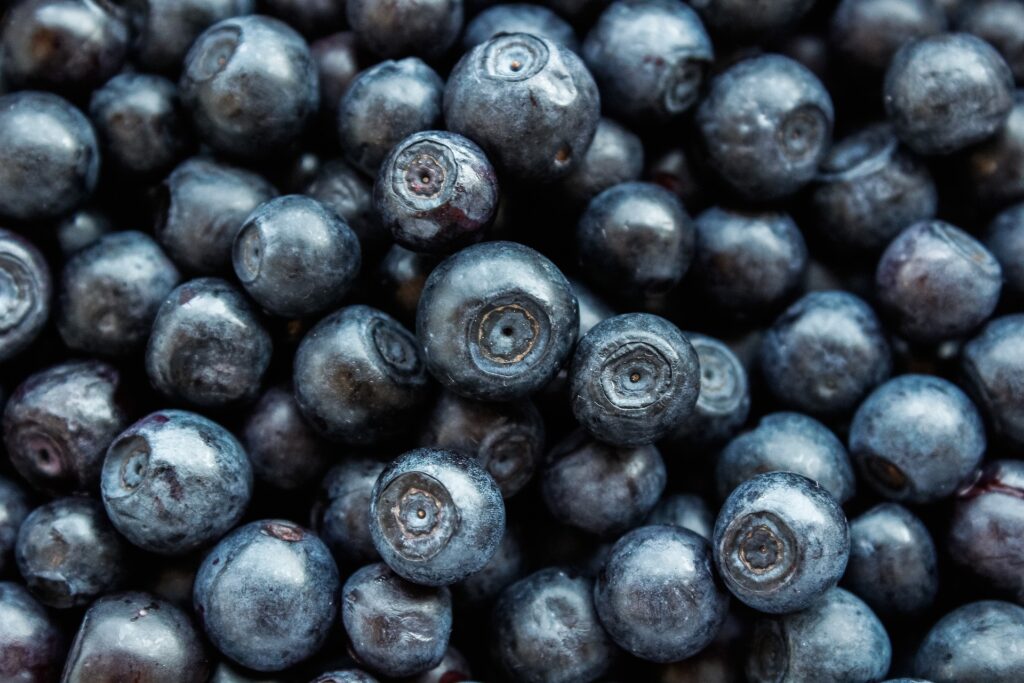
Table of Contents
Overview
Berries are among the healthiest foods you can consume. These small, colorful fruits pack an enormous nutritional punch, offering a wealth of vitamins, minerals, antioxidants, and fiber. From improving heart health to enhancing cognitive function, berries have long been hailed as a superfood, providing a range of health benefits that extend beyond basic nutrition. In this comprehensive guide, we’ll explore the various types of berries, their specific health advantages, and how incorporating them into your diet can significantly improve your overall well-being.
1. Blueberries
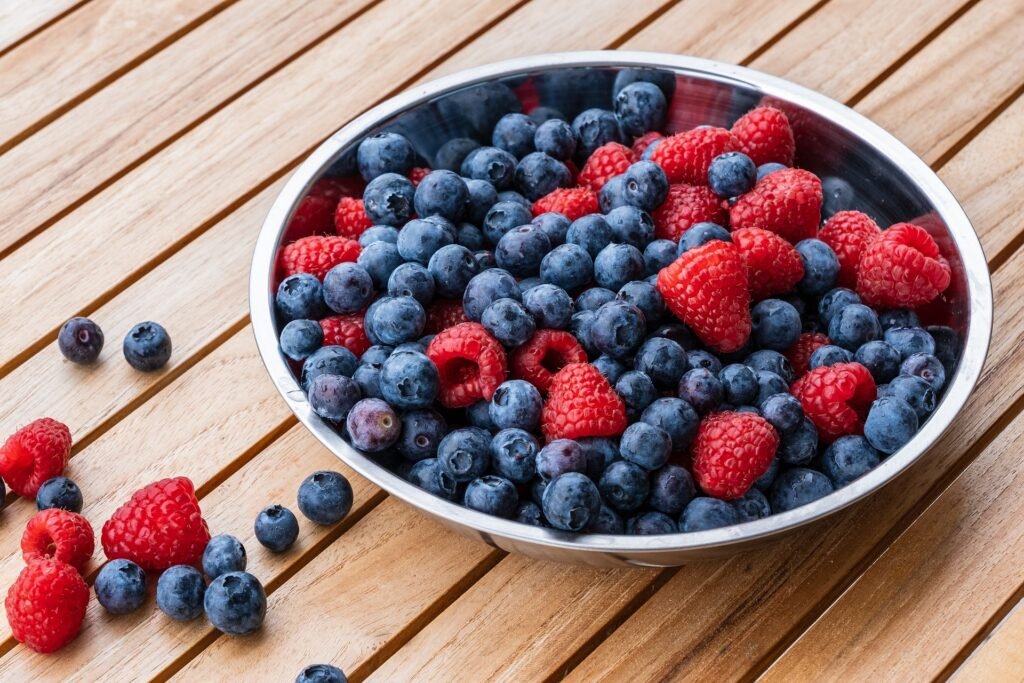
Blueberries are often referred to as the “king of antioxidants” for good reason. Their deep blue color comes from anthocyanins, a type of antioxidant that helps protect cells from oxidative stress and inflammation. Studies suggest that regular consumption of blueberries may help reduce the risk of chronic diseases such as heart disease, cancer, and cognitive decline
RELATED : The health benefits of eating berries
- Heart Health: The antioxidants in blueberries can help reduce “bad” LDL cholesterol levels while increasing “good” HDL cholesterol, improving overall cardiovascular health.
- Cognitive Function: Blueberries are often associated with improved memory and brain function. Regular intake may slow age-related cognitive decline and improve brain health.
How to Eat Blueberries: Add them to smoothies, sprinkle them on oatmeal, or eat them as a quick snack. Their versatility and sweetness make them a perfect addition to any meal
2. Strawberries

Strawberries are rich in vitamin C, antioxidants, and polyphenols, all of which contribute to a healthy heart. These heart-shaped fruits help regulate blood sugar, lower cholesterol levels, and reduce inflammation. They are also a great source of fiber, which is crucial for digestive health.
- Cholesterol Control: Strawberries contain ellagic acid, which may help reduce cholesterol levels and improve heart health by reducing inflammation in the arteries.
- Weight Management: Low in calories but high in water content, strawberries are a filling snack that can help with weight management.
How to Eat Strawberries: Enjoy them fresh, dip them in dark chocolate for a healthy dessert, or add them to salads and yogurt
RELATED : Health Benefits of Eating Grapes Every Day
3. Blackberries
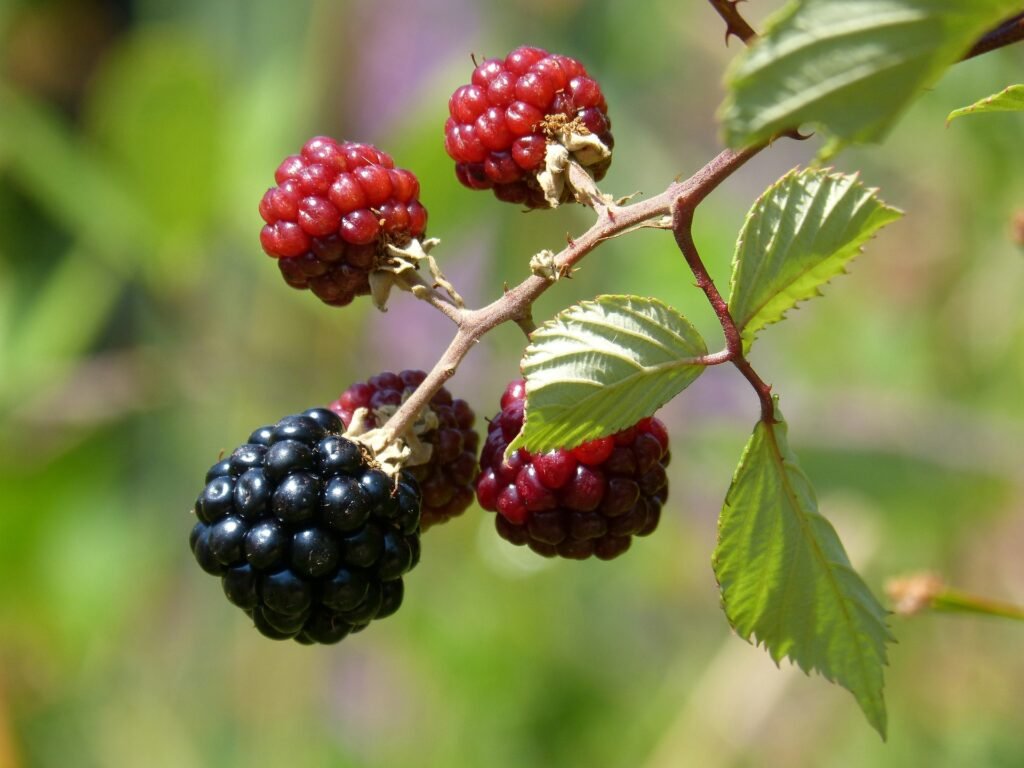
Blackberries are known for their high fiber content, which aids digestion and helps maintain healthy blood sugar levels. They are also rich in vitamin C, vitamin K, and manganese, essential for bone health and immunity.
- Blood Sugar Regulation: The fiber in blackberries slows the absorption of sugar, preventing blood sugar spikes and making them an ideal fruit for people with diabetes or those looking to manage their blood sugar levels.
- Bone Health: Blackberries contain high levels of vitamin K, which plays a critical role in bone metabolism and helps prevent fractures.
How to Eat Blackberries: Add them to your cereal or yogurt for a nutrient boost, or enjoy them on their own as a snack
4. Raspberries

Raspberries are not only delicious but also packed with powerful antioxidants like quercetin and ellagic acid, which help reduce inflammation and prevent cell damage. They are also low in sugar and calories, making them an excellent choice for those trying to lose weight.
- Anti-Inflammatory Properties: Raspberries contain flavonoids that reduce inflammation in the body, helping to prevent chronic conditions such as heart disease and arthritis.
- Weight Loss: The high fiber content in raspberries helps you feel full longer, curbing overeating and supporting weight loss efforts.
How to Eat Raspberries: Mix them into your smoothies, sprinkle them on top of desserts, or add them to your salad for a burst of color and flavor.
5. Cranberries

Cranberries are famous for their ability to prevent urinary tract infections (UTIs) by inhibiting bacteria from adhering to the bladder walls. But their benefits don’t stop there. Cranberries are rich in antioxidants and may help reduce the risk of certain cancers, improve heart health, and boost immunity
RELATED : 15 The Health Benefits of Purple Foods
- UTI Prevention: The proanthocyanidins in cranberries prevent bacteria from sticking to the urinary tract lining, reducing the risk of infections.
- Cancer Prevention: Some studies suggest that cranberry extract may help prevent certain cancers, particularly those of the breast, colon, and prostate, due to its high antioxidant content.
How to Eat Cranberries: Opt for unsweetened cranberry juice or add fresh cranberries to sauces and baked goods for a tart flavor boost
6. Acai Berries

Acai berries are often labeled as a superfood due to their high antioxidant content. They are native to the Amazon rainforest and have been used for centuries to promote health and longevity. Acai berries are rich in anthocyanins, which may reduce oxidative stress and lower the risk of several chronic diseases.
- Heart Health: Acai berries can help reduce cholesterol levels and improve blood circulation, which benefits heart health.
- Skin Health: The antioxidants in acai berries may also protect the skin from aging and environmental damage.
How to Eat Acai Berries: Acai is commonly consumed in smoothie bowls or as a supplement, but make sure to avoid products with added sugars.
7. Goji Berries
RELATED : benefits of tart cherry juice for your health
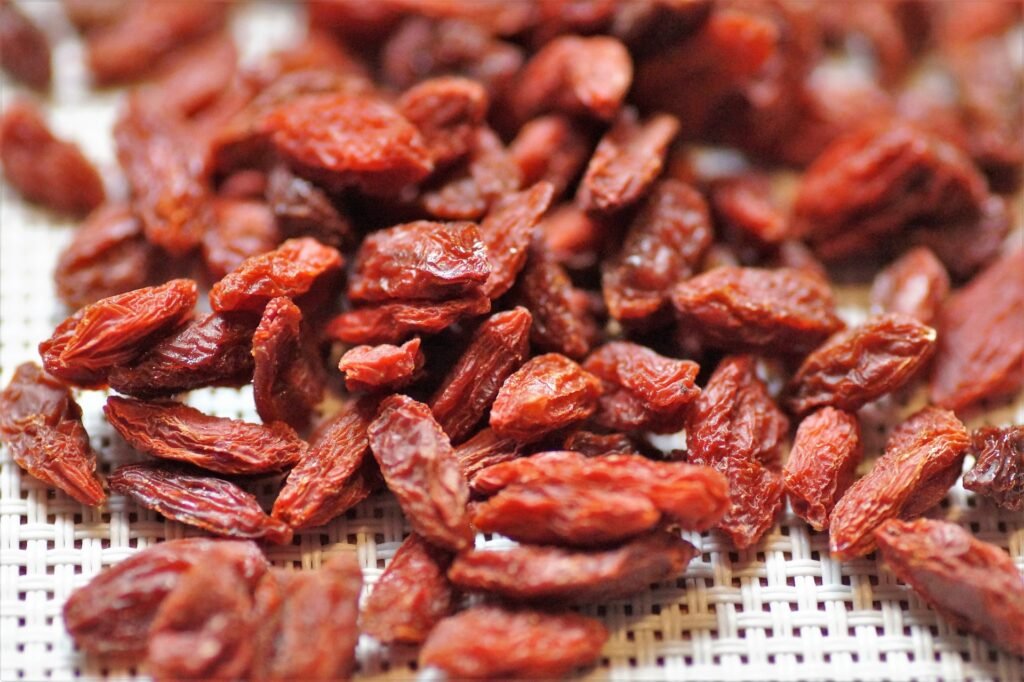
Goji berries, also known as wolfberries, have been used in traditional Chinese medicine for thousands of years. They are believed to improve immunity, support eye health, and boost energy levels. These tiny red berries are rich in antioxidants, particularly zeaxanthin, which is known to protect the eyes from oxidative damage.
- Eye Health: The high concentration of zeaxanthin in goji berries can help protect the retina and reduce the risk of macular degeneration, a leading cause of blindness in older adults.
- Immune Boost: Goji berries contain a variety of vitamins and minerals that can help support immune function, making them a great addition to your diet during flu season.
How to Eat Goji Berries: Eat them dried as a snack, or add them to your cereals and salads for a nutritious crunch
8. Elderberries

Elderberries have been traditionally used to treat colds and flu. Rich in vitamins and antioxidants, elderberries may help reduce the severity and duration of flu symptoms when taken at the onset of illness.
- Cold and Flu Relief: Elderberry extract is known for its antiviral properties, which may help reduce the symptoms of colds and flu.
- Anti-Inflammatory: Elderberries have anti-inflammatory effects that can help relieve symptoms of other inflammatory conditions, such as arthritis.
How to Eat Elderberries: Elderberry syrups or teas are common ways to consume this berry, but consult with a healthcare provider before using elderberry supplements.
9. Avocados
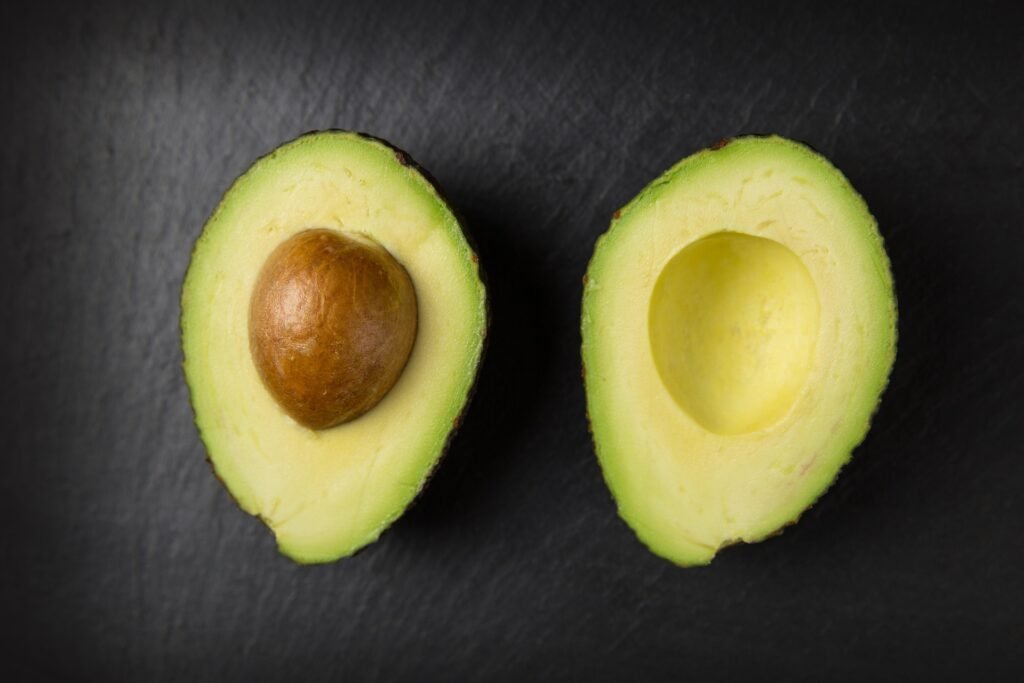
Though often mistaken for a vegetable, avocados are technically berries. They are packed with healthy fats, vitamins, and minerals that benefit heart health, brain function, and digestion. Avocados are also an excellent source of potassium, which can help regulate blood pressure.
- Heart Health: The monounsaturated fats in avocados help lower bad cholesterol while increasing good cholesterol, protecting against heart disease.
- Weight Management: Despite being high in calories, avocados can aid in weight loss by promoting a feeling of fullness, preventing overeating.
How to Eat Avocados: Mash them on toast, blend them into smoothies, or slice them up for salads and sandwiches
10. Berries and Cognitive Health
Many berries, particularly blueberries and strawberries, have been linked to improved cognitive function. Research suggests that the antioxidants in these fruits may help protect the brain from oxidative damage and reduce the effects of aging on the brain.
- Memory Boost: Studies have shown that consuming berries regularly can improve memory and slow cognitive decline in older adults.
- Neuroprotection: The polyphenols in berries help protect the brain from inflammation, which can lead to cognitive decline and neurodegenerative diseases.
The Takeaway
Berries are a nutritional powerhouse, offering a wide range of health benefits. They are loaded with antioxidants, vitamins, and fiber, making them an essential part of a balanced diet. Whether you are looking to boost heart health, improve cognitive function, manage your weight, or simply enjoy a delicious and nutritious snack, there is a berry out there for you.
By incorporating a variety of berries into your daily routine—fresh, frozen, or dried—you can easily enhance your health and well-being. So, the next time you’re at the grocery store, grab a handful of these nature’s superfoods and start reaping the benefits today
Frequently Asked Questions
- What are the most nutritious berries to include in my diet?
- Blueberries, strawberries, blackberries, raspberries, and cranberries are some of the most nutritious berries. They are high in antioxidants, vitamins, and fiber, which provide numerous health benefits such as improved heart health, brain function, and digestive support.
- Can berries help with weight loss?
- Yes, berries are low in calories and high in fiber, which helps promote a feeling of fullness, preventing overeating. Berries like raspberries and strawberries are especially beneficial for weight management due to their low sugar content and high water composition.
- How do berries benefit heart health?
- Berries are rich in antioxidants, such as anthocyanins, which help reduce inflammation, lower bad cholesterol (LDL), and improve good cholesterol (HDL). These factors contribute to better heart health and lower the risk of cardiovascular diseases.
- Are berries good for people with diabetes?
- Yes, many berries, such as blackberries and blueberries, have a low glycemic index and are rich in fiber, which helps regulate blood sugar levels. Their high antioxidant content can also help reduce inflammation, making them a safe and healthy choice for people with diabetes.
- Can berries improve cognitive function?
- Absolutely. Berries, particularly blueberries and strawberries, have been shown to improve memory and cognitive function due to their high levels of antioxidants and polyphenols, which protect the brain from oxidative stress and age-related decline.
- How can I incorporate more berries into my diet?
- You can easily add berries to your diet by mixing them into smoothies, sprinkling them on oatmeal or yogurt, adding them to salads, or enjoying them as a snack. Frozen berries are just as nutritious as fresh ones and can be used in a variety of dishes.











